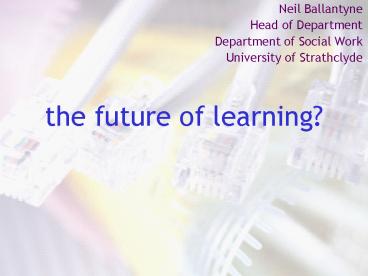the future of learning PowerPoint PPT Presentation
1 / 26
Title: the future of learning
1
the future of learning?
- Neil Ballantyne
- Head of Department
- Department of Social Work
- University of Strathclyde
2
Paradigm shift in education
- FROM
- INDUSTRIAL SOCIETY
- technology peripheral
- once-only education
- fixed curriculum
- teaching focus
- self-contained
- local focus
- TO
- INFORMATION SOCIETY
- multimedia central
- lifelong learning
- flexible curriculum
- learner focus
- partnerships
- global networking
3
Technology trends
- Mobile
- Wireless
- Ubiquitous
- High resolution
- User friendly
- Relatively cheap
- RONDIRead-only non-digital interface
4
(No Transcript)
5
(No Transcript)
6
What is e-learning?
- Networked access to digital learning material
and communication systems to deliver and support
learning
Joint SFEFC/SHEFC e-Learning Group (2003)
7
What is e-learning?
This learner is learning with technology, but how
is he learning? What pedagogical assumptions
have the designers of the learning experience
made? How active or passive is the learner in
the learning process? Is he interacting with
students and tutors or only with a learning
package? Is his learning a blend of face to face
and online experiences or solely online?
8
The transmission model
- New technologies are too often used simply as a
different way of continuing old educational
practices. - Of attempting to transmit knowledge from the
educator to the learner. - But educational research suggests this approach
leads to shallow learning that doesnt transfer
to new, real world situations.
9
The transmission model
- "Education thus becomes an act of depositing, in
which the students are the depositories and the
teacher is the depositor. Instead of
communicating, the teacher issues communiqués and
make deposits which the students patiently
receive, memorize, and repeat... - apart from inquiry...individuals cannot be
truly human. - Knowledge emerges only through invention and
re-invention." - Paulo FreirePedagogy of the Oppressed (1993)
10
Seymour Papert on the future of learning
- When any new technology is invented, its first
use is putting a new twist on what people were
doing before. It takes time for the technology to
give rise to really new practices and the new
cultures that support them.
11
Seymour Papert on the future of learning
- For instance, the first idea of a movie was to
act a play, as if in a theatre, in front of the
newly invented cameras. - It took many years, many people and many ideas
before "technology-aided theatre" turned into the
modern art of film-making. - A movie is now very different from a play acted
in front of a camera.
12
Constructivism
- Learning is a social process.
- Knowledge is constructed by active participants
in a learning community. - Effective learning is focused on authentic
problem situations. - What the learner does is far more important than
what the teacher does.
13
A continuum of e-learning
The course in a box
Blended learning
Human interaction support
Highly structured self-paced CBL
14
Networked learning
- We define 'networked learning' as learning in
which CIT is used to promote connections - between one learner and other learners
- between learners and tutors
- between a learning community and its learning
resources. - Centre for Advanced Learning Technologies
- University of Lancaster
15
Emergent e-Learning paradigm
- Put learning before technology
- Constructivism
- effective learning is active collaborative
- Problem-based learning
- learning for effective and ethical practice
- Blended learning
- online face to face
16
Adoption problems
- Ownership and the Not invented here syndrome.
- Development costs.
- Inflexible courses rather than adaptable
resources. - Skills, confidence and attitudes of educators.
17
Adoption solutions
- Collaborative development across institutions.
- Reusable learning resources - learning objects.
- Digital repositories libraries of LOs
- E-learning advisors.
18
What is a learning object?
- A learning object is a digital resource designed
to support the achievement of a learning
objective - Different levels of granularity from a single
image to a larger course component - Designed to be small, flexible, adaptable, and
reusable in a range of contexts - Stored in a digital repository
19
What is a digital repository
- A searchable library of learning objects
- Structured by an agreed subject vocabulary or
taxonomy - Accessible by educators and or students
- University of Calgary
- Video clip Objects of Desire
20
Scottish Institute for Excellencein Social Work
Education
- Knowledge transfer project
- Funded by SHEFC, the Scottish Executive and the
Scottish HEIs - 1 million between now and July 2005
21
Knowledge Transfer Project
- Build a repository
- Establish a repository, structured by an agreed
taxonomy of the new social work curriculum. - Create learning objects
- Develop high-quality, multi-media conceptual and
case-based digital learning resources for the new
social work curriculum. - Advise and support educators
- Enhance the skill and understanding of social
work educators and trainers in effectively
embedding use of digital learning resources into
the social work curriculum.
22
KT Project Network
- Glasgow Caledonian University
- Robert Gordons University
- Open University (Scotland)
- University of Dundee
- University of Edinburgh
- University of Glasgow
- University of Paisley
- University of Stirling
- University of Strathclyde
23
KT Project Staff
- Project Manager
- Information Scientist
- Learning Technologist
- Administrator
- e-Learning Adviser (Robert Gordons U)
- e-Learning Adviser (U of Edinburgh)
U of Strathclyde
24
The future of learning
- Learning resources
- Problem-based, active, interactive, reusable,
shared, rich, authentic, relevant, multi-media. - Learners
- Lifelong, active, motivated, creative, enquiring,
critical, reflective, collaborative. - Environment
- Adaptive, flexible, work-related, work-based.
- Tutors
- Supportive, knowledgeable, skilled, networked.
- Technology
- Anytime, anyplace, ubiquitous, wireless, mobile.
25
The future of learning?
- The best way to predict the future, is to invent
it! - Alan Kay (1971)
26
Finding out more?
- neil.ballantyne_at_strath.ac.uk
- www.sieswe.org.uk

